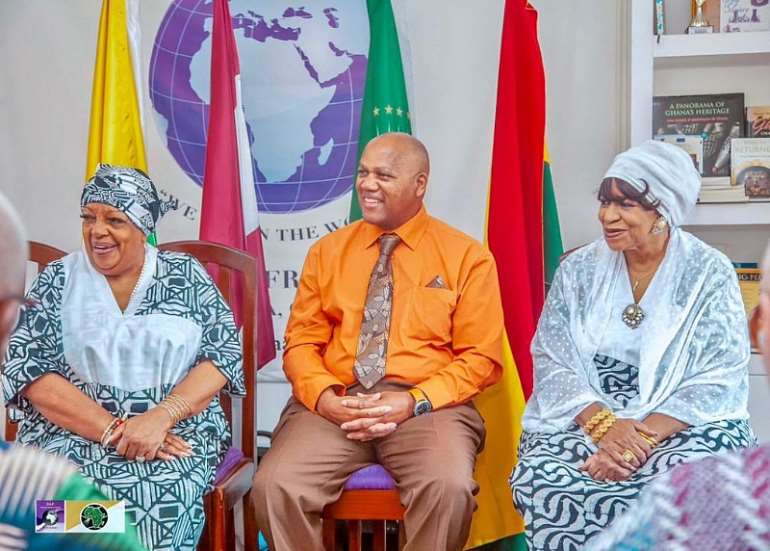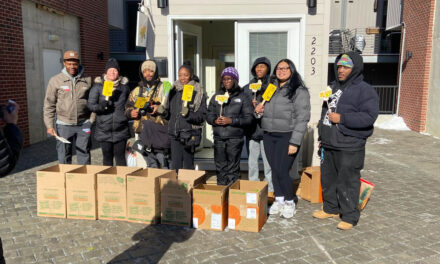
The sun cast its long shadows across the serene grounds of the W.E.B. Du Bois Memorial Centre for Pan-African Culture in Accra in anticipation of a spiritual reawakening.
Jeffrey Alan Peck, the great-grandson of the legendary civil rights activist W.E.B. Du Bois, had embarked on mission of reawakening journey to Ghana as he stood before his ancestor’s final resting place.
The moment was heavy with emotion; a mix of pride, reverence, and a deep sense of connection that spanned generations.
Peck, a Houston native with a life dedicated to advancing the legacy of his great-grandfather, had made this journey before — five times to Ghana, to be exact.
But this visit, in the wake of his mother’s passing in 2021, carried a weight like no other.
He says, “This is my fifth time here, but it’s the first time I’ve come with a promise to fulfil. My mother made me promise that I would come to ensure that everything about his final resting place was up to the standards of the kind of person he was.”
Dr William Edward Burghardt Du Bois who was born in 1868 in Great Barrington, Massachusetts, was a towering figure in American an Panafricain history.
A pioneering sociologist, historian, and civil rights leader, Du Bois was the first African American to earn a Ph.D. from Harvard University.
His seminal work, “The Souls of Black Folk (1903), introduced the concept of “double consciousness” and remains a cornerstone of African American literature and thought.
Du Bois’ impact extended far beyond the borders of the United States as he was a fervent advocate for Pan-Africanism, believing in the unity and liberation of the African.
In 1961, in the twilight of his life, Du Bois moved to Ghana at the invitation of President Kwame Nkrumah, where he became a citizen and continued his work until he died in 1963.
His burial in Ghana cemented his lifelong commitment to the African continent and its people.
For Jeffrey Alan Peck, Du Bois’ legacy is not just history — it is a living, breathing responsibility.
“I’ve been in his birthplace, and now I’m in his passing place. It’s very special and emotional because of what he meant to my mother and what she meant to me,” Alan Peck reflects in an interview with the Ghana News Agency in a tone blended with awe and solemnity.
The visit was more than a pilgrimage; it was a reaffirmation of a family’s enduring commitment to the principles that Du Bois championed — racial justice, equality, and the unity of the African diaspora.
At the Du Bois Memorial Centre, Peck, flanked by Ambassador Dr Erieka Bennett, the Convening Founder and Head of Mission of the Diaspora Africa Forum (DAF), Dr Nana Baa Wiredu, Managing Director, Tourism Resource and Development and Marketing, and Dr Toni Luck, Co-Founder of DAF, placed his great-grandfather’s name – etched on granite tiles – on the Sankofa Wall, a symbolic act to reconnect with him.
The Sankofa Wall, located at the Diaspora African Forum, at the W.E.B. Du Bois Centre, features notable personalities from the African diaspora and continental Africans who have made significant impact in the world.
Peck’s journey to Ghana was not only a fulfilment of his mother’s wish but also a continuation of Du Bois’ vision for a world where African descendants across the globe could connect with their roots and celebrate their shared heritage.
“It was almost like I felt I was walking in his steps. I feel like I’m fulfilling what God put me here to do,” Peck states, describing the overwhelming sense of connection he had experienced.
W.E.B. Du Bois’ legacy is monumental, not just for his academic achievements or his role in co-founding the National Association for the Advancement of Coloured People (NAACP) in 1909, but for his relentless pursuit of justice and equality for all people of African descent.
His influence on civil rights movements, both in the United States and across the African continent, is immeasurable.
In Ghana, Du Bois’ contributions to Pan-Africanism are particularly revered as his work in organizing Pan-African Congresses and advocating for the independence of African nations positioned him as a key figure in the global fight against colonialism.
Even after his death, his ideas continue to inspire movements for racial and social justice worldwide.
Ambassador Dr Ereika Bennett, reflecting on the momentous occasion, described the naming of the Memorial Centre for Pan-African Culture in honour of W.E.B. Du Bois as nothing short of “iconic.”
She notes, “It is an honour to have his great-grandson at the Centre to mount his name on the wall. It is incredible.”
She re-echoed a powerful inscription on the Sankofa Wall with renewed optimism: “We are the hopes and dreams of our ancestors.”
Dr Nana Baa Wiredu, the Managing Director of Tourism Resource Development and Marketing, expressing delight at the visit said, “It is refreshing to my mind; it refreshes who I am and I am very proud to know that this day, what I thought was just happening by chance, has become a reality.”
Dr Wiredu, himself a Pan-Africanist who had the privilege of meeting Dr Du Bois in Ghana, notes that “his memory, his life and who he was will never perish in the minds of Ghanaians and everybody who knows who he is.”
Jeffery Alan Peck could not help but think of the younger generations of African Americans as he remarked in a steady but impassioned voice, walking on the grounds of the Du Bois Centre, “My advice to them [African Americans] would be to visit Africa.”
“Come and see all the things that I’ve had a chance to see. We’ve seen TV shows, we’ve read books and pamphlets, but they don’t do the real story justice. When you come and see it for yourself, it’s a feeling you haven’t yet gotten — a sense of pride but also sorrow for what our ancestors went through,” he noted.
“The people here [Ghana] are just extremely kind and nice, naturally,” he stressed.
For Peck, this visit was more than just a trip to a foreign land; it was a journey home – a journey that reconnected him with the legacy of a great man who, in many ways, shaped the course of history.
“It’s a great feeling; I feel like I’m fulfilling the prophecy, and there’s no greater honour than that,” he concluded.
Jeffrey Alan Peck’s visit to Ghana was a poignant reminder of the unbroken thread that connects the struggles of the past with the challenges of the present.
It demonstrates the sacrifices made by those who came before and a call to action for future generations to continue the fight for equality.
As the sun set over Accra, casting a warm glow over the Du Bois Centre, it was clear that the legacy of W.E.B. Du Bois is alive and well, carried forward by the generations that follow in his footsteps and guided by his enduring vision of justice, equality, and unity.


